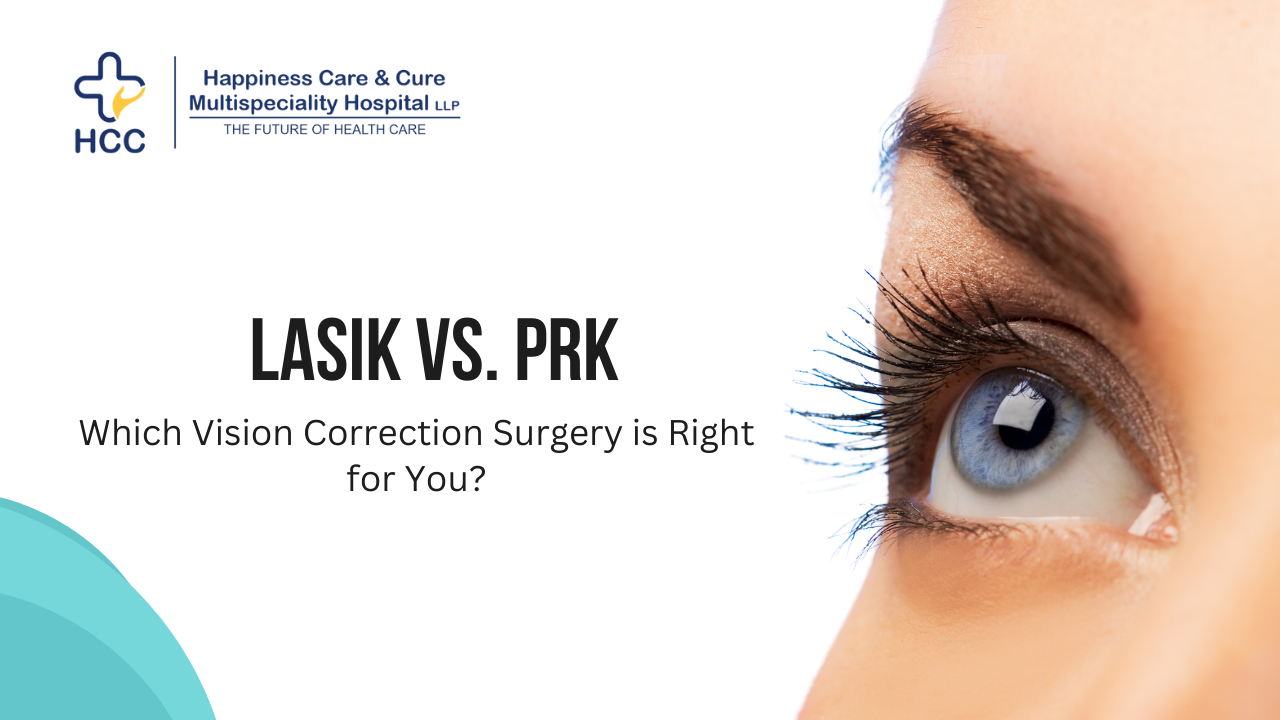
In the world of vision correction surgeries, LASIK (Laser-Assisted In Situ Keratomileusis) and PRK (Photorefractive Keratectomy) stand out as two prominent procedures, each offering a pathway to clearer vision. However, determining which one is best suited for your individual needs requires an understanding of their differences, advantages, and considerations. To shed light on this topic, we turn to the expertise of Dr. Rahika Patel, a renowned eye surgeon at HCC Hospital in Ahmedabad, for insights into these transformative surgeries.
Understanding LASIK:
LASIK has garnered widespread popularity for its efficiency in correcting refractive errors like nearsightedness, farsightedness, and astigmatism. This procedure involves creating a thin flap on the cornea using a microkeratome or a femtosecond laser. The cornea's inner tissue is then reshaped using an excimer laser, correcting the refractive error. The flap is repositioned, allowing for a swift recovery.
Dr. Rahika Patel emphasizes LASIK's advantages, highlighting its rapid visual recovery and minimal discomfort post-surgery. Many patients experience improved vision within 24 hours, with minimal reliance on glasses or contacts.
Insights into PRK:
PRK, on the other hand, predates LASIK and involves reshaping the cornea's surface directly. Instead of creating a flap, the surgeon removes the cornea's epithelial layer entirely before using the excimer laser to reshape the underlying corneal tissue. The absence of a flap distinguishes PRK from LASIK, resulting in a longer recovery period.
Dr. Patel elaborates on PRK's benefits, noting its suitability for patients with thinner corneas or those involved in activities where there's a risk of eye trauma. PRK also eliminates the potential flap-related complications seen in LASIK.
Choosing Between LASIK and PRK:
Determining the ideal procedure necessitates considering various factors. Dr. Patel underscores the importance of a comprehensive eye examination and discussions with a qualified ophthalmologist. Factors such as corneal thickness, eye health, lifestyle, and preferences play pivotal roles in deciding between LASIK and PRK.
For individuals with an active lifestyle or certain corneal characteristics that may not be ideal for LASIK, PRK emerges as a viable alternative. However, those seeking quicker visual recovery might lean towards LASIK.
Potential Risks and Considerations:
Both LASIK and PRK boast high success rates, but they aren't without risks. Dr. Patel emphasizes the significance of understanding potential complications, such as dry eyes, halos, glare, or over/under-correction. These risks vary in frequency and severity and are crucial discussion points during consultations.
Moreover, factors like age, stability of vision, and overall eye health contribute to the final decision. Dr. Patel advises patients to maintain realistic expectations and follow post-operative care diligently to optimize outcomes.
Post-Surgery Care and Recovery:
Post-operative care significantly influences the success of vision correction surgeries. Dr. Patel stresses the importance of adhering to prescribed medications, attending follow-up appointments, and avoiding activities that may strain the eyes during the initial recovery phase.
Both LASIK and PRK require patience, as visual acuity improvements may take time. However, following the recommended guidelines facilitates a smoother recovery and enhances the chances of achieving the desired results.
Conclusion:
In conclusion, LASIK and PRK stand as effective solutions for vision correction, each with its unique set of advantages and considerations. Dr. Rahika Patel's expertise underscores the importance of a thorough consultation with an experienced eye surgeon to determine the most suitable procedure based on individual needs and circumstances.
Ultimately, the decision between LASIK and PRK should be made in collaboration with a qualified ophthalmologist, considering factors like corneal health, lifestyle, and recovery expectations. With proper guidance and realistic expectations, both procedures offer remarkable opportunities for clearer vision and improved quality of life.
At HCC Hospital in Ahmedabad, Dr. Rahika Patel continues to empower individuals seeking vision correction, guiding them towards the most appropriate solution tailored to their specific requirements. Vision correction surgery is a life-changing decision, and with the right information and professional guidance, individuals can confidently stride towards a clearer, brighter future.
Remember, the journey to clearer vision begins with a conversation with a trusted eye care professional.
Make an Appoinment